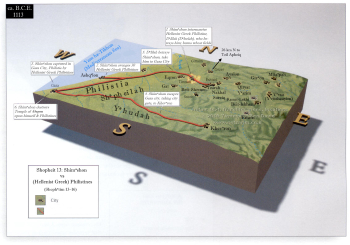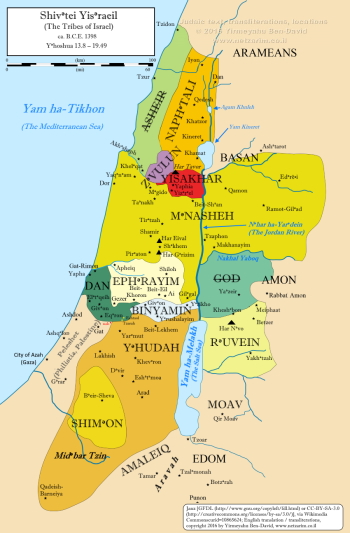
 |

 |
The realization that he and his wife had an encounter with a ma•lâkhꞋ![]() é‑‑ä frightened Mân•ōꞋakh, stirring his idolatrous superstitions: "We're gonna die because we saw ël•ōh•imꞋ!" he wailed.
é‑‑ä frightened Mân•ōꞋakh, stirring his idolatrous superstitions: "We're gonna die because we saw ël•ōh•imꞋ!" he wailed.
But his ish•âhꞋ was more level-headed. "If é‑‑ä wished to kill us then His ma•lâkhꞋ![]() wouldn't have accepted our grill-offering and the accompanying Mi•nᵊkh•âhꞋ; nor would He have shown us all of these things, nor told us these things."
wouldn't have accepted our grill-offering and the accompanying Mi•nᵊkh•âhꞋ; nor would He have shown us all of these things, nor told us these things."
So the ish•âhꞋ gave birth to a son, and called his name Shi•mᵊsh•ōnꞋ Bën-Mân•ōꞋakh.![]() As the boy grew, é‑‑ä blessed him; and the RūꞋakh é‑‑ä animated him throughout the Dân
As the boy grew, é‑‑ä blessed him; and the RūꞋakh é‑‑ä animated him throughout the Dân![]() Tribal Region, between Tzâ•rᵊâhꞋ
Tribal Region, between Tzâ•rᵊâhꞋ![]() and Ëshᵊtâ•ōlꞋ.
and Ëshᵊtâ•ōlꞋ.![]()
 |
One day, Shi•mᵊsh•ōnꞋ Bën-Mân•ōꞋakh![]() trekked down from his home in NaꞋkhal SōꞋreiq, in the foothills of YᵊhūdꞋâh, to Ti•mᵊn•âhꞋ,
trekked down from his home in NaꞋkhal SōꞋreiq, in the foothills of YᵊhūdꞋâh, to Ti•mᵊn•âhꞋ,![]() in the Shᵊpheil•âhꞋ, where he saw a Pᵊli•shᵊt•itꞋ
in the Shᵊpheil•âhꞋ, where he saw a Pᵊli•shᵊt•itꞋ![]() named DᵊlilꞋâh.
named DᵊlilꞋâh.![]()
When he had trekked back up to his home in NaꞋkhal SōꞋreiq, in the foothills of YᵊhūdꞋâh, he told his father and mother, "I've found the ish•âhꞋ!![]() She's a Pᵊli•shᵊt•itꞋ
She's a Pᵊli•shᵊt•itꞋ![]() down in Ti•mᵊn•âhꞋ.
down in Ti•mᵊn•âhꞋ.![]() So now, make the arrangements for her to be my ish•âhꞋ.
So now, make the arrangements for her to be my ish•âhꞋ.![]()
Horrified that their nâ•zirꞋ son, Shi•mᵊsh•ōnꞋ![]() — who didn't even cut his hair, eat anything tâ•reiphꞋ or drink any alcoholic beverage — would acculturate to intermarry a Greek Pᵊli•shᵊt•itꞋ,
— who didn't even cut his hair, eat anything tâ•reiphꞋ or drink any alcoholic beverage — would acculturate to intermarry a Greek Pᵊli•shᵊt•itꞋ,![]() his father and mother pleaded with him, trying to dissuade him. "Is there no ish•âhꞋ
his father and mother pleaded with him, trying to dissuade him. "Is there no ish•âhꞋ![]() among all of the daughters of your brothers or among all of my am?" they inveighed. "Why do you insist on an ish•âhꞋ
among all of the daughters of your brothers or among all of my am?" they inveighed. "Why do you insist on an ish•âhꞋ![]() from among the idolatrous Greek Pᵊli•shᵊt•inꞋ foreign rulers?"
from among the idolatrous Greek Pᵊli•shᵊt•inꞋ foreign rulers?"
"Just arrange it," Shi•mᵊsh•ōnꞋ![]() persisted. "I'm convinced that she's the right
persisted. "I'm convinced that she's the right![]() ish•âhꞋ
ish•âhꞋ![]() for me."
for me."
Although his Dad and Mom didn't realize it, this was from é‑‑ä. For Shi•mᵊsh•ōnꞋ![]() sought a pretext-inroad into the Pᵊli•shᵊt•inꞋ, to foment a conflict because, at that time, the Pᵊli•shᵊt•inꞋ were the rulers in Yi•sᵊr•â•eilꞋ.
sought a pretext-inroad into the Pᵊli•shᵊt•inꞋ, to foment a conflict because, at that time, the Pᵊli•shᵊt•inꞋ were the rulers in Yi•sᵊr•â•eilꞋ.

Optional parental preparation:
What is the meaning of ecumenism? Syncretism? Assimilation? Acculturation? Intermarriage? (marriage between a man and an ish•âhꞋ, one of whom is in the Bᵊrit Tōr•âhꞋ but the other is not in the Bᵊrit Tōr•âhꞋ)
13.24, ùÑÄîÀùÑåÉï — Shi•mᵊsh•ōnꞋ (Bën-Mân•ōꞋakh, ha-Nâ•zirꞋ); popularly in English "Samson (son of Manoakh, the Nazirite)". ùÑÄîÀùÑåÉï is the diminutive familiar form of ùÑÆîÆùÑ (shëmꞋësh; sun) + hypocoristic suffix; hypocorism roughly meaning “little sun”; i.e., “Sunny”, “Sunny-boy” or “Sunshine”.![]()
What does the verb "animate" mean?
14.01 — DᵊlilꞋâh — ãÌÀìÄéìÈä (pronounced DᵊleelꞋâh); deficient, of scant means; a poor girl, rag-doll, a cinder-Ella (as in the fairy tale about a family fireplace cinder-sweep girl named Ella). She is named in ch. 16. ![]()
14.01 — úÄîÀðÈä (Ti•mᵊn•âhꞋ) — Pᵊli•shᵊt•inꞋ Greek colony ≈7 km (4.3 mi) NW of Tzâ•rᵊâhꞋ![]() ; modern Israeli mō•shâvꞋ èÇì ùÇÑçÇø (not the úÌîÀðÇò (Ti•mᵊn•aꞋ) mines in the NëgꞋëv).
; modern Israeli mō•shâvꞋ èÇì ùÇÑçÇø (not the úÌîÀðÇò (Ti•mᵊn•aꞋ) mines in the NëgꞋëv). ![]()
What does "trek" mean?
14.02, àÄùÌÑÈä — DᵊlilꞋâh![]() is described as Shi•mᵊsh•ōnꞋ’s
is described as Shi•mᵊsh•ōnꞋ’s![]() ish•âhꞋ before any wedding had taken place and still living in her father's house;
ish•âhꞋ before any wedding had taken place and still living in her father's house;![]() i.e. before she was his wife!!! Ergo, through all of this story, DᵊlilꞋâh
i.e. before she was his wife!!! Ergo, through all of this story, DᵊlilꞋâh![]() is more specifically Shi•mᵊsh•ōnꞋ’s
is more specifically Shi•mᵊsh•ōnꞋ’s![]() a•rūs•âhꞋ, not his wife as defined in the modern world!!!
a•rūs•âhꞋ, not his wife as defined in the modern world!!! ![]()
What does "inveigh" mean?
What does it mean to be "uncircumcised"? (Bᵊrit Mil•âhꞋ)
Questions you might anticipate that your child might raise and be prepared to discuss:
What does "level-headed" mean?
What are "foothills"?
What does "dissuade" mean?
What does "horrified" mean?
What does it mean to "persist"?
What is a pretext?
![]()
 |
 |